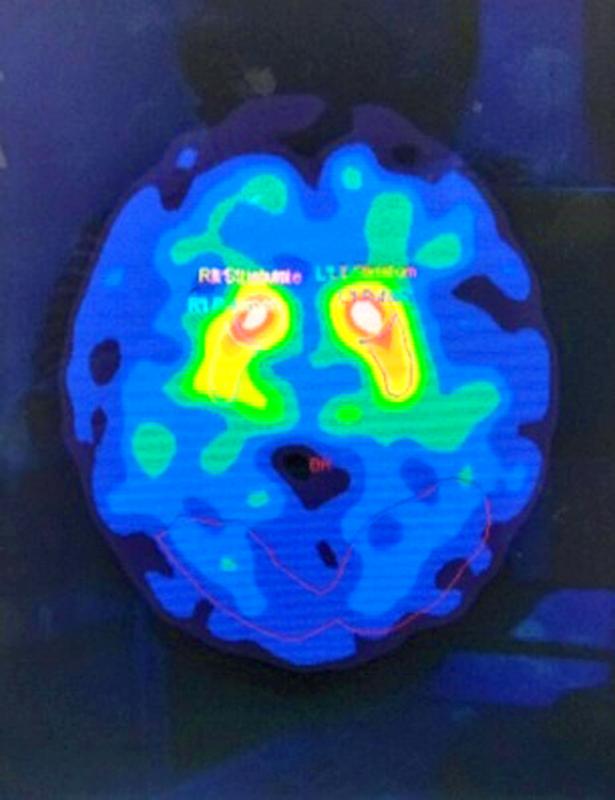Having frequent nightmares that result in a damp pillow, despite not sweating anywhere else, might be an early sign of Parkinson’s disease, a Taichung-based neurologist said.
Such symptoms present a useful diagnostic indicator, as early diagnosis of Parkinson’s results in better treatment, said Yeh Shou-cheng (葉守正), director of neurology at Cheng Ching Hospital’s Chung Kang Branch.
To illustrate what to look out for, Yeh gave the example of a 59-year-old woman who visited his clinic for treatment.

Photo courtesy of the Chung Kang Branch of Cheng Ching Hospital
When the woman came in, her face was expressionless and her blinking was unnatural, so he asked her to touch her index fingers to her thumbs in a test of basic motor function, Yeh said.
A person can ordinarily perform the movement 15 times or more in five seconds, but she was only able to do 10, he said.
When he asked her to raise both arms, he found that her right arm was trembling slightly.
He then administered a dopamine transporter scan (DaTscan), which is used to help diagnose Parkinson’s disease before more severe symptoms arise.
After evaluating her symptoms and abnormal DaTscan results, Yeh diagnosed the woman with early-stage Parkinson’s disease.
The woman said that over the past six months, she had been having recurring nightmares and waking up in a sweat, but only from her head, along with a dry mouth.
After ruling out autoimmune issues such as Sjogren’s syndrome for the dryness, Yeh determined that it was caused by neurodegeneration.
As her body was unable to produce sweat, the sweating became concentrated on her head, he said.
Sweating abnormalities are a symptom of early Parkinson’s due to the degeneration of autonomic nerves, he said, adding that detailed differential diagnosis is required to avoid any mistakes, as Parkinson’s patients should not take certain drugs that affect the immune system.
Frequent nightmares could also be a sign of Parkinson’s, as the disease is associated with low concentrations of dopamine, which helps regulate sleep, he added.
If the woman had not come in for treatment, she would have experienced hand tremors and difficulty moving after about two years, Yeh said.
To treat Parkinson’s disease, aside from certain medications, Yeh recommended exercising often.
He also recommended eating more antioxidants, such as broccoli, spinach and other dark greens, in addition to foods high in beta-carotene, such as seaweed, cherry tomatoes and carrots.
Research has shown that nearly 90 percent of people who shout or move around when experiencing nightmares develop Parkinson’s after 10 to 12 years, he said, adding that early discovery is the biggest challenge for doctors.
Yeh said that on average, he diagnoses more than 50 cases of early-stage Parkinson’s per year.
Men and women are about equally likely to develop the disease, which is almost always diagnosed between the ages of 50 and 60, he said.
The most common indicators are dryness in the mouth and eyes, insomnia, anxiety, constipation, olfactory disorders and sweating from the head, Yeh said, urging anyone with these symptoms to see a doctor as soon as possible.

The brilliant blue waters, thick foliage and bucolic atmosphere on this seemingly idyllic archipelago deep in the Pacific Ocean belie the key role it now plays in a titanic geopolitical struggle. Palau is again on the front line as China, and the US and its allies prepare their forces in an intensifying contest for control over the Asia-Pacific region. The democratic nation of just 17,000 people hosts US-controlled airstrips and soon-to-be-completed radar installations that the US military describes as “critical” to monitoring vast swathes of water and airspace. It is also a key piece of the second island chain, a string of

A magnitude 5.9 earthquake that struck about 33km off the coast of Hualien City was the "main shock" in a series of quakes in the area, with aftershocks expected over the next three days, the Central Weather Administration (CWA) said yesterday. Prior to the magnitude 5.9 quake shaking most of Taiwan at 6:53pm yesterday, six other earthquakes stronger than a magnitude of 4, starting with a magnitude 5.5 quake at 6:09pm, occurred in the area. CWA Seismological Center Director Wu Chien-fu (吳健富) confirmed that the quakes were all part of the same series and that the magnitude 5.5 temblor was

Taiwan will now have four additional national holidays after the Legislative Yuan passed an amendment today, which also made Labor Day a national holiday for all sectors. The Chinese Nationalist Party (KMT) and Taiwan People’s Party (TPP) used their majority in the Legislative Yuan to pass the amendment to the Act on Implementing Memorial Days and State Holidays (紀念日及節日實施辦法), which the parties jointly proposed, in its third and final reading today. The legislature passed the bill to amend the act, which is currently enforced administratively, raising it to the legal level. The new legislation recognizes Confucius’ birthday on Sept. 28, the

The Central Weather Administration has issued a heat alert for southeastern Taiwan, warning of temperatures as high as 36°C today, while alerting some coastal areas of strong winds later in the day. Kaohsiung’s Neimen District (內門) and Pingtung County’s Neipu Township (內埔) are under an orange heat alert, which warns of temperatures as high as 36°C for three consecutive days, the CWA said, citing southwest winds. The heat would also extend to Tainan’s Nansi (楠西) and Yujing (玉井) districts, as well as Pingtung’s Gaoshu (高樹), Yanpu (鹽埔) and Majia (瑪家) townships, it said, forecasting highs of up to 36°C in those areas